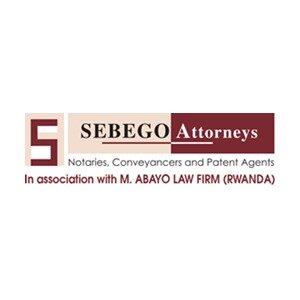Best Intellectual Property Lawyers in Gaborone
Share your needs with us, get contacted by law firms.
Free. Takes 2 min.
List of the best lawyers in Gaborone, Botswana
About Intellectual Property Law in Gaborone, Botswana
Intellectual Property (IP) law in Gaborone, Botswana, is designed to protect creators and inventors by granting them exclusive rights to their creations, inventions, and brands. It encompasses various legal areas, including copyrights, trademarks, patents, and industrial designs. The IP law framework in Botswana aligns with international standards, offering robust protection mechanisms for both local and international stakeholders. The Botswana Intellectual Property Policy (BIPP) aims to foster innovation, creativity, and economic growth within the country.
Why You May Need a Lawyer
There are several situations in which individuals or businesses may require legal assistance in the field of Intellectual Property:
- To register a trademark, patent, or industrial design with the appropriate authorities.
- To protect copyrighted material and ensure compliance with copyright laws.
- To negotiate licensing agreements and contracts related to IP assets.
- To address IP infringement issues, such as unauthorized use or duplication of protected material.
- To navigate the legal complexities of IP litigation and dispute resolution.
- To seek advice on IP strategies and portfolio management.
- To conduct IP audits and due diligence for mergers, acquisitions, or collaborations.
Local Laws Overview
Botswana’s Intellectual Property laws are governed by several key statutes and regulations:
- Industrial Property Act: Governs the protection of patents, trademarks, and industrial designs. It provides the framework for the registration and enforcement of these IP rights.
- Copyright and Neighboring Rights Act: Protects literary, musical, and artistic works, including computer programs and databases. It also covers performers' rights and broadcasters' rights.
- Counterfeit Goods Act: Addresses the issue of counterfeit goods and provides mechanisms for their seizure and destruction.
- Competition Act: Regulates anti-competitive practices that may affect IP, such as price-fixing and market monopolies.
These laws are enforced by various agencies, including the Companies and Intellectual Property Authority (CIPA), which oversees the registration and administration of IP rights in Botswana.
Frequently Asked Questions
What is a trademark, and how do I register one in Botswana?
A trademark is a sign capable of distinguishing the goods or services of one enterprise from those of others. To register a trademark in Botswana, you must file an application with the Companies and Intellectual Property Authority (CIPA). The application should include details about the trademark, the goods or services it will represent, and payment of the prescribed fees.
What is a patent, and how long does it last?
A patent is an exclusive right granted for an invention, which must be new, involve an inventive step, and be capable of industrial application. In Botswana, a patent lasts for 20 years from the date of filing, provided annual renewal fees are paid.
How can I protect my copyright in Botswana?
Copyright protection in Botswana is automatic upon the creation of an original work. You do not need to register copyright, but it is advisable to keep records of your work's creation to prove ownership if needed. The Copyright and Neighboring Rights Act provides the legal framework for this protection.
What should I do if I discover someone is infringing on my IP rights?
If you discover IP infringement, you should consult with an IP lawyer to assess the situation and determine the best course of action. This may include sending a cease-and-desist letter, negotiating a settlement, or pursuing legal action through the courts.
Can I license my IP rights to others?
Yes, you can license your IP rights to others through a licensing agreement. This agreement should specify the terms, scope, and duration of the license. It is advisable to consult an IP lawyer to draft or review the licensing agreement to ensure your rights are adequately protected.
What are industrial designs, and how do I protect them?
Industrial designs refer to the ornamental or aesthetic aspects of an article, such as shapes, patterns, or colors. To protect an industrial design in Botswana, you must register it with the Companies and Intellectual Property Authority (CIPA). Protection lasts for five years and can be renewed for additional five-year periods up to a maximum of 15 years.
How do I enforce my IP rights in Botswana?
IP rights can be enforced through civil litigation, where you can seek remedies such as injunctions, damages, or account of profits. In some cases, criminal proceedings may be initiated for offenses like counterfeiting. Enforcement actions should be guided by an IP lawyer.
What is the role of the Companies and Intellectual Property Authority (CIPA)?
CIPA is the regulatory body responsible for the registration and administration of IP rights in Botswana. It manages the national IP registry, processes applications for IP protection, and provides information and support to IP rights holders.
How do I know if my invention is patentable?
An invention is patentable if it is new, involves an inventive step, and is capable of industrial application. A patent search can help determine if similar inventions exist. Consulting with a patent attorney can provide a detailed assessment of your invention's patentability.
Are there any IP rights protections for traditional knowledge and folklore in Botswana?
Yes, Botswana recognizes the importance of protecting traditional knowledge and folklore. Certain laws and regulations provide measures to safeguard these cultural assets, ensuring they are not misappropriated or exploited without proper authorization.
Additional Resources
Several resources and organizations can provide further assistance and information on IP rights in Botswana:
- Companies and Intellectual Property Authority (CIPA): The primary body for IP registration and administration in Botswana.
- Ministry of Investment, Trade and Industry (MITI): Focuses on promoting trade, investment, and industrial development, including IP policy.
- Botswana Innovation Hub (BIH): Supports innovation and technology-driven enterprises, offering guidance on IP management and commercialization.
- Botswana Intellectual Property Professionals Association (BIPPA): A professional body representing IP practitioners in the country.
- World Intellectual Property Organization (WIPO): Provides global IP services, information, and support, with relevance to Botswana's IP framework.
Next Steps
If you need legal assistance with Intellectual Property in Gaborone, Botswana, consider taking the following steps:
- Identify Your Needs: Determine the specific IP issues you need help with, such as registration, enforcement, or licensing.
- Consult with a Qualified IP Lawyer: Seek advice from a lawyer specializing in IP law to understand your rights and options.
- Gather Documentation: Prepare any necessary documents related to your IP assets, such as creation records, contracts, and previous correspondences.
- File Applications: If you need to register IP rights, work with your lawyer to file the necessary applications with CIPA.
- Enforce Your Rights: If facing infringement issues, discuss enforcement strategies with your lawyer to protect your interests.
- Stay Informed: Keep yourself updated on IP laws and policies in Botswana to ensure ongoing compliance and protection.
By taking these steps, you can effectively navigate the complexities of Intellectual Property law in Gaborone, Botswana, and secure your creative and innovative endeavors.
Lawzana helps you find the best lawyers and law firms in Gaborone through a curated and pre-screened list of qualified legal professionals. Our platform offers rankings and detailed profiles of attorneys and law firms, allowing you to compare based on practice areas, including Intellectual Property, experience, and client feedback.
Each profile includes a description of the firm's areas of practice, client reviews, team members and partners, year of establishment, spoken languages, office locations, contact information, social media presence, and any published articles or resources. Most firms on our platform speak English and are experienced in both local and international legal matters.
Get a quote from top-rated law firms in Gaborone, Botswana — quickly, securely, and without unnecessary hassle.
Disclaimer:
The information provided on this page is for general informational purposes only and does not constitute legal advice. While we strive to ensure the accuracy and relevance of the content, legal information may change over time, and interpretations of the law can vary. You should always consult with a qualified legal professional for advice specific to your situation.
We disclaim all liability for actions taken or not taken based on the content of this page. If you believe any information is incorrect or outdated, please contact us, and we will review and update it where appropriate.
Browse intellectual property law firms by service in Gaborone, Botswana
Gaborone, Botswana Attorneys in related practice areas.












